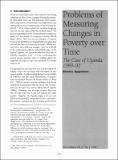| dc.contributor.author | Appleton, Simon | en |
| dc.date.accessioned | 2016-02-24T15:58:41Z | |
| dc.date.available | 2016-02-24T15:58:41Z | |
| dc.date.issued | 01/01/1996 | en |
| dc.identifier.citation | Appleton, S. (1996) Problems of Measuring Changes in Poverty over Time: The Case of Uganda 1989–92. IDS Bulletin 27(1): 43-55 | en |
| dc.identifier.issn | 1759-5436 | en |
| dc.identifier.uri | https://opendocs.ids.ac.uk/opendocs/handle/20.500.12413/9253 | |
| dc.description.abstract | Summaries Official reports on household surveys of Uganda in 1989 and 1992 imply a 34 per cent fall in real consumption per household. Various adjustments are considered which reduce the apparent fall in living standards to 6 per cent. However, even these adjusted figures imply worsening living standards, increased poverty and greater inequality. The reliability of such comparisons is questioned based on discrepancies concerning production estimates, household size, recall periods and budget shares. It is hypothesized that these discrepancies arise from differences in survey design. Such sensitivity suggests that estimates of economic welfare from conventional household surveys are more relative than commonly thought. | en |
| dc.format.extent | 13 | en |
| dc.publisher | Institute of Development Studies | en |
| dc.relation.ispartofseries | IDS Bulletin Vol. 27 Nos. 1 | en |
| dc.rights.uri | http://www.ids.ac.uk/files/dmfile/IDSOpenDocsStandardTermsOfUse.pdf | en |
| dc.title | Problems of Measuring Changes in Poverty over Time: The Case of Uganda 1989–92 | en |
| dc.type | Article | en |
| dc.rights.holder | © 1996 Institue of Development Studies | en |
| dc.identifier.doi | 10.1111/j.1759-5436.1996.mp27001005.x | en |

